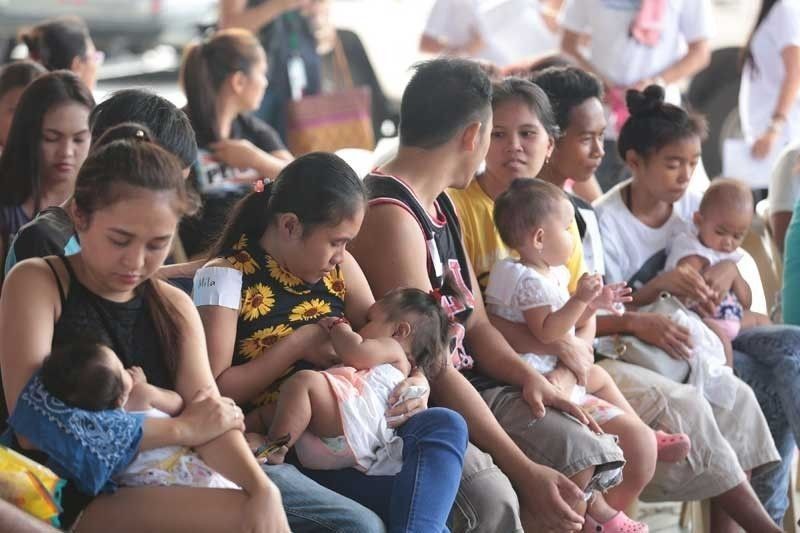Experts, advocates urge action on ‘unseen crisis of unintended pregnancy'

MANILA, Philippines — Experts and advocates from governments and civil societies sounded the alarm on what they said was an “unseen crisis” on a global scale with nearly half of all pregnancies—about 121 million—unintended.
This was disclosed in the 2022 State of World Population Report by the United Nations Population Fund which defined “unintended pregnancy” as one “that occurs to a woman who was not planning to have any [more] children, or that was mistimed, in that it occurred earlier than desired.”
“An unintended pregnancy may be simply overlooked as a personal crisis. What we would like to emphasize is that the issue entails staggering national, and even global, costs,” pointed out Population and Development Undersecretary Juan Antonio Perez III, executive director of the Commission on Population and Development.
“The aftereffects cannot be captured in numbers—including the opportunity costs of millions of women and girls who delay or discontinue their education or workforce participation due to unplanned pregnancies," he also said in the group's press release sent to media Thursday morning.
Analyzing new data, the UNFPA found that some 257 million women who want to avoid pregnancy globally are not using safe and modern methods of contraception. New data also showed that about half of all adolescent mothers are child-mothers.
Pregnancy crisis in the Philippines
The Philippines also joins Bangladesh, Benin, Chad, and Indonesia, with “more than a fifth of first births to girls under the age of 18” coming from premarital conception that often precedes the marriage of girls.
Closer to home, the report found staggering statistics on the Philippines, including:
- 36 in every 1,000 Filipino girls aged 15 to 19 already gave birth between 2004 and 2020
- 6% of women experienced intimate partner violence in the past 12 months perto 2017 data
- 71 in every 1,000 women aged 15 to 49 went through an unintended pregnancy between 2015 and 2019.
- The Philippines ranks 56th among 150 countries for the number of unintended pregnancies at 71 per 1,000 women annually
- 51% of all pregnancies are unintended which is almost the same as the global average
“This is a crisis that remains unaddressed, even as many institutions – even the government – have repeatedly sounded the alarm,” noted Philippine Legislators' Committee on Population and Development Executive Director Romeo Dongeto.
He was referring to Executive Order No. 141 issued by outgoing President Rodrigo Duterte, which called on government instrumentalities to address the root causes of adolescent pregnancy.
"Even our economic managers had dubbed adolescent pregnancy as a ‘national social emergency.’ Yet the latest SWOP report reveals that the Philippines has yet to fully untangle the several complex layers of this issue that exacerbate the situation,” Dongeto stressed.
“Currently, the Philippines has several laws and regulations that guarantee access to sexual and reproductive health care, information, and education, primarily Republic Act No. 10354 or the Reproductive Health Law. However, much needs to be understood and faced head on by policymakers, civic leaders, and the whole of society to ensure that we reach a future where every pregnancy is wanted."
'Complex issue needs multi-pronged solutions'
Dr. Leila Saiji Joudane, Country Representative of UNFPA in the Philippines, noted that the crisis of unintended pregnancy is a crisis with many facets, as it is a personal, health, human rights, humanitarian, and development issue.
She added that women in countries with more equality, empowerment, and financial resources are better able to address an unintended pregnancy or avoid it in the first place.
“Many unintended pregnancies happen despite a woman’s best efforts. It happens usually as a result of unequal social and economic conditions that women face that lead to unintended pregnancies,” Joudane said.
“There is systemic discrimination against women and girls. This is an unseen crisis unfolding right before our eyes, and a global failure to uphold basic human rights for women and girls."
Perez noted that in the coming months, a “heightened, multi-pronged campaign” to address unintended pregnancy will be launched.
It will focus on:
- Reducing gender inequality and empowering women and girls;
- Guaranteeing access to the broadest range of contraceptives and quality sexual and reproductive health care everywhere, including in humanitarian settings;
- Educating young people about sexuality and reproduction; and
- Increasing access to education and employment opportunities for women and girls to empower them to make informed choices
“We, all – from governments to individuals – need to raise up the value of women and girls. That is why we call on policymakers and civic leaders to join hands in leading this endeavor,” Joudane said.
"Together, let us exert all efforts to successfully bring us closer to the shared vision for humanity – a world in which every pregnancy is wanted, every childbirth is safe, and every young person’s potential is fulfilled."
- Latest
- Trending



































